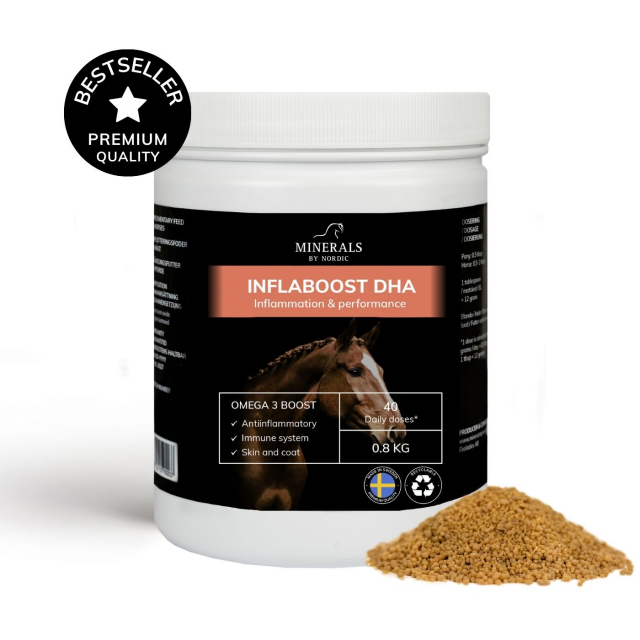
How omega-3 can support joints and immune system
Omega-3 fatty acids are essential components for the health and well-being of horses. These fatty acids offer a variety of benefits and are crucial for ensuring that your horse is healthy and in good condition. In this article, we will explore what Omega-3 fatty acids are and why they are so important for horses.
Omega-3 fatty acids are a type of polyunsaturated fatty acid that has been shown to have many health benefits for horses. These fatty acids help support the cardiovascular system, reduce inflammation, and improve joint health. They are also good for promoting healthy skin and coat. By including Omega-3 in your horse's diet, in addition to hardfeed etc., you can ensure the horse receives the necessary nutrients to stay healthy and active.
Symptoms of Omega-3 deficiency in horses
It is important to be aware of the symptoms of Omega-3 deficiency in horses. If your horse is not getting enough of these fatty acids, it may experience the following symptoms:
◼︎ Weakened immune system
◼︎ Skin problems - dry skin, itching, and loss of fur quality.
◼︎ Deteriorated hoof quality - brittle and fragile.
◼︎ Inflammation and stiffness

Omega-3 and joint health in horses
Joint health is crucial for a horse's mobility and performance. Omega-3 fatty acids have been shown to be particularly beneficial for the joint health of horses. Omega-3 helps to reduce inflammation in the joints and can help prevent joint issues and stiffness. By including Omega-3 in your horse's diet, you can help prevent joint problems and ensure that your horse remains agile and healthy.
How is Omega-3 important for the construction and maintenance of cartilage tissue in the joints?
Anti-inflammatory properties: Omega-3 fatty acids, especially eicosapentaenoic acid (EPA) and docosahexaenoic acid (DHA), have potent anti-inflammatory properties. Inflammation can contribute to the breakdown of cartilage and lead to joint diseases such as arthritis. By reducing inflammation, omega-3 fatty acids can help protect the cartilage.
Health of cell membranes: Omega-3 fatty acids are an essential component in the cell membranes throughout the body, including in the cartilage cells (chondrocytes). A healthy cell membrane structure is crucial for the function and survival of cells.
Lubrication of the joints: Omega-3 can also help increase the amount of lubricating fluid (synovial fluid) in the joints, which facilitates mobility and reduces friction, protecting the cartilage.
Prevention of cartilage degradation: Research suggests that omega-3 fatty acids can help prevent the breakdown of cartilage. This can be particularly important for individuals suffering from degenerative joint diseases.
Omega-3 for laminitis, EMS, PPID - Cushing's
Omega-3 fatty acids can be beneficial for sugar-sensitive horses, such as those suffering from laminitis (founder) or Equine Metabolic Syndrome (EMS). PPID, or Pituitary Pars Intermedia Dysfunction, is an endocrine disorder that typically affects older horses. It is sometimes also referred to as Cushing's disease. PPID affects the horse's pituitary gland and leads to increased production of adrenocorticotropic hormone (ACTH). This increase can cause various health problems in horses, including increased appetite, increased thirst, increased urination, muscle weakness, and increased susceptibility to infections. Diagnosis should always be made by a veterinarian. Here's how Omega-3 can support these types of horses:
Support for the immune system: Horses with PPID are more susceptible to infections due to their compromised immune system. Omega-3 can help strengthen the immune system and reduce the risk of infections.
Skin and coat improvement: Omega-3 can help improve the skin and coat quality of horses with PPID, which is often negatively affected by the disease.
Anti-inflammatory properties: Omega-3 fatty acids have strong anti-inflammatory properties. In laminitis and EMS, there may be an underlying inflammatory process. Omega-3 can help reduce the inflammatory response, thereby reducing pain and discomfort.
Insulin regulation: In horses with EMS, insulin resistance is common, meaning the body's cells do not respond adequately to insulin. Omega-3 fatty acids can help improve insulin function and reduce insulin resistance, which is important for managing EMS.
Reduce the risk of hoof inflammation: In laminitis, inflammation of the hooves is common. Omega-3 can help reduce the inflammatory process and thereby reduce the risk of founder.
Sources of Omega-3 for Horses
To ensure that your horse gets enough Omega-3 fatty acids in its diet, it's important to know the different sources. One of the best natural sources of Omega-3 for horses is fresh grass and pasture. It is rich in these fatty acids and provides an excellent source of nutrition. In terms of supplements, Omega-3 can be obtained from a number of different sources, but the best source of high Omega-3 content is found in Inflaboost DHA, which is a vegan microalgae.
The microalgae is produced in controlled vessels, which is a much more climate-friendly alternative than, for example, fish oil. In the production of Omega-3, 40 tons of marine-caught fish are needed to produce 1 ton of Omega-3 supplement. Therefore, the vegan option is a more sustainable choice.
Common questions about omega-3 fatty acids for horses
Why are Omega-3 fatty acids important for horses?
Omega-3 fatty acids are important for horses because they support the cardiovascular system, reduce inflammation, and improve joint health. They also help promote healthy skin and coat.
What symptoms might indicate a deficiency of Omega-3 in horses?
Symptoms of Omega-3 deficiency in horses can include a weakened immune system, skin problems such as dryness and itching, deteriorated hoof quality, and increased inflammation and stiffness.
How can I ensure that my horse gets enough Omega-3?
You can ensure that your horse gets enough Omega-3 by including natural sources such as fresh grass and pasture in its diet, and using Omega-3 supplements such as Inflaboost DHA.
Can Omega-3 help prevent joint problems in horses?
Yes, Omega-3 fatty acids have anti-inflammatory properties that can help reduce inflammation in the joints and prevent joint problems and stiffness in horses.
Does Omega-3 help with osteoarthritis?
Yes, Omega-3 fatty acids can help with osteoarthritis. Osteoarthritis is a disease that affects the joints and can cause pain and stiffness. Omega-3 fatty acids, such as DHA (docosahexaenoic acid), have anti-inflammatory properties that can be beneficial for osteoarthritis. These fatty acids can help reduce inflammation in the joints, thereby alleviating pain and improving mobility. They can also support the structure and function of the joints.
References:
Elzinga, S.E., Betancourt, A., Stewart, J.C., Altman, M.H., et. al., 2019. Effects of docosahexaenoic acid-rich microalgae supplementation on metabolic and inflammatory parameters in horses with equine metabolic syndrome. Journal of Equine Veterinary Science, 83, 102811.
Jacobs, R.D. 2015. Dietary supplementation of omega-3 fatty acids influences the equine maternal uterine environment and embryonic development.
Buist, S.E., J.M. Kouba, J.D. Lillich, et al. 2015. Peripartum maternal DHA/EPA supplementation and the effect on mare reproductive parameters and foal bone metabolism. Journal of Equine Veterinary Science 35(5):441.
Adams, L.A., Grady, S.T., Seale, J. & Cavinder, C.A. 2008. Supplementing fatty acids to improve sperm characteristics.
Adkin, A.M., Muniz, A.V., Mortensen, C.J., & Warren, L.K. 2015. Maternal fatty acid supplementation influences memory and learning ability in yearling and 2-year-old horses. Journal of Equine Veterinary Science, 35(5), 419.
Howard H. Erickson, DVM, PhD; Tammi S. Epp, DVM, PhD*; and David C.Poole, PhD,DS. Review of Alternative Therapies for EIPH
Kearns, C. F., McKeever, K. H., Malinowski, K., & Struck, S. (2019). The effect of a Schizochytrium-based dietary supplement on the omega-3 fatty acid content of equine milk. Journal of equine veterinary science, 72, 46-50.
Tifft, K. E., & Kearns, C. F. (2017). The effect of a Schizochytrium-based dietary supplement on the omega-3 fatty acid content of horse plasma and red blood cells. Journal of Equine Veterinary Science, 52, 1-5.

 SWE
SWE
 ENG
ENG NO
NO AX
AX DE
DE